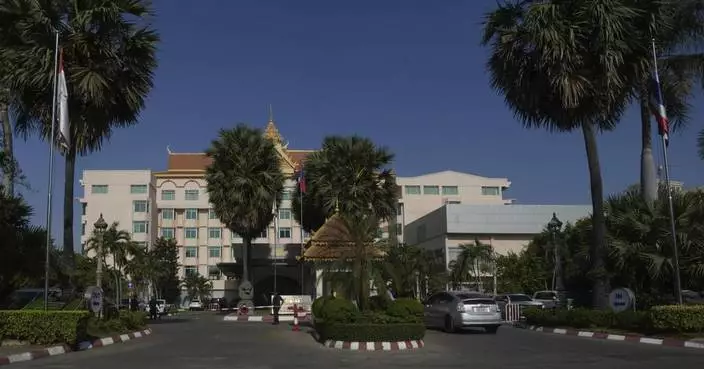After five straight weekends of disruptive and sometimes violent protests across France, police are taking a turn expressing anger at the French government.
Two police unions complained Monday about working conditions and what they said were strained resources as officers have been sent in to clear road blockades and to control trouble-makers at street demonstrations bent on provoking them.
The Alliance union urged the government to invest in rebuilding the country's police forces while calling for a work slowdown Wednesday to protest planned cuts in the national police budget.
Another union, UNSA police, said its members only would provide minimum services Tuesday and asked for a meeting with French President Emmanuel Macron. The union asked the government earlier this month for payment of overtime hours officers put in work quelling the protests.
"Police are not doing well and nobody is listening," Frederic Lagache, of the Alliance union, said.
Lagache's union said that French lawmakers are set to vote on 62 million euros ($70 million) in budget cuts this week that "will once again result in downgraded work conditions," if approved.
Alliance is encouraging police forces to stay inside their stations on Wednesday and only to respond to emergency calls.
Alliance said French lawmakers should vote against the government's 2019 budget and warns "that other actions will be implemented" if President Emmanuel Macron "does not quickly announce a Marshall Plan for the national police."
The "yellow vest" protests, named after the fluorescent safety vests French motorists must carry, started last month over rising fuel prices. They since have morphed into a mass show of dissatisfaction involving pensioners, people without jobs and small business owners.
The UNSA union threatened Monday to mimic yellow vests protests and to occupy roundabouts if its demands were not met.
"The roundabouts are not reserved for yellow vests only," the union said in a statement. UNSA said.
NEW YORK (AP) — Even as many Americans say they learn about the 2024 election campaign from national news outlets, a disquieting poll reveals some serious trust issues.
About half of Americans, 53%, say they are extremely or very concerned that news organizations will report inaccuracies or misinformation during the election. Some 42% express worry that news outlets will use generative artificial intelligence to create stories, according to a poll from the American Press Institute and The Associated Press-NORC Center for Public Affairs Research.
The poll found 47% of Americans also expressing serious concern that news outlets would report information that has not been confirmed or verified, and 44% worry that accurate information will be presented in a way that favors one side or another.
Half of Americans say they get election news always or frequently from national news outlets, a percentage that is higher among older respondents, the poll found.
“The level of engagement is good,” said Michael Bolden, CEO of the American Press Institute. “The thing that's most concerning is that they're not sure they can actually trust the information.”
Years of suspicion about journalists, much of it sown by politicians, is partly responsible, he said. People are also less familiar with how journalism works. The poll found about half of respondents say they have at least a moderate amount of confidence in the information they receive from either national or local news outlets when it comes to the 2024 elections, though only about 1 in 10 say they have a great deal of confidence.
“There may have been a time when people knew a journalist because one lived on their block,” Bolden said. “The way the industry has been decimated, that's much less likely.”
Simply putting out the news often isn't good enough anymore, he said. There's a growing disconnect between news organizations and communities that the outlets need to address, by helping to let people know what journalists do and how people reporting news are their friends and neighbors, he said.
Outlets should lean into a convenor role, bringing people together for newsworthy events, he said.
About half of U.S. adults say they follow the news about presidential elections closely, with older adults being more engaged. About two-thirds of Americans age 60 or older say they keep a close eye on presidential election news, compared wth roughly one-third of those under age 30.
The same trend is seen with local and state election news. While the poll found that 46% of Americans age 60 or older say they follow news about local and state elections closely, only 16% of people age 18 to 29 said the same thing.
“As they transition to becoming older people, will they begin to care?” Bolden asked. “If they don't begin to care, what will that mean for local and state communities?”
Young people, those under age 30, are about as likely to get election news from social media or friends or family as they are to get it from national or local news outlets, the poll found. Black and Latino adults are somewhat more likely to express “a great deal” of confidence in the reliability of social media as a source of election news than white Americans are.
That's both a warning sign, since there is a lot more misinformation to be found on social media, and an opportunity for traditional outlets to make more of their work available this way, Bolden said.
About 6 in 10 Democrats say they get election news from national outlets at least frequently. That's more than the 48% of Republicans or 34% of independents, according to the poll. Republicans are more likely than Democrats and independents to express concern about inaccurate information or misinformation in news coverage during the upcoming elections. About 6 in 10 Republicans are concerned about this, compared with about half of Democrats.
Besides inaccuracies, many also expressed serious concern about election news that focuses too much on division or controversies or concentrates on who may win or lose — the horserace aspect of political coverage — rather than issues or the character of candidates.
Most Americans say that for them to make informed decisions about the 2024 state and local elections, they want national and local news outlets to highlight candidates’ values or their different positions on key social issues. In each case, about three-quarters of U.S. adults say they would like “a lot” or "some" coverage of these topics.
The poll of 2,468 adults was conducted March 21-25, 2024, using a sample drawn from NORC’s probability-based AmeriSpeak Panel, which is designed to be representative of the U.S. population. The margin of error is plus or minus 2.9 percentage points.
David Bauder writes about media for The Associated Press. Follow him at http://twitter.com/dbauder.

FILE - Journalists line the press stand before Republican presidential candidate former President Donald Trump speaks at a caucus night party in Des Moines, Iowa, Jan. 15, 2024. Attitudes toward the media and political news ahead of the election were explored in a poll from the American Press Institute and The Associated Press-NORC Center for Public Affairs Research. (AP Photo/Andrew Harnik, File)










